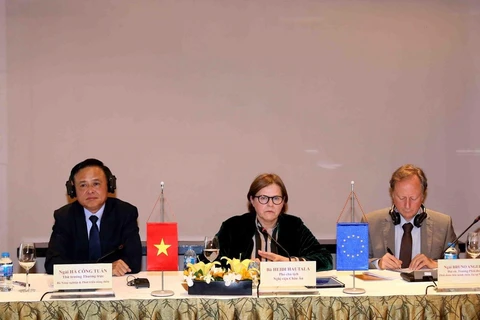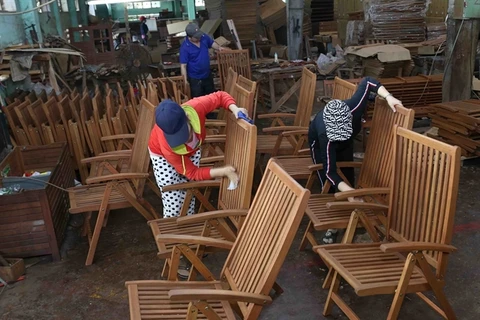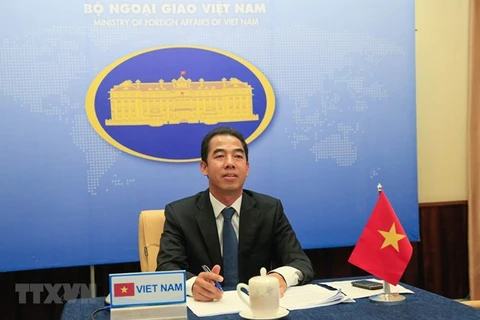 To Kim Lien, Director of the Centre for Education and Development (CED) at the online workshop on September 28. (Photo courtesy of the project “Ensuring timber legality in the domestic market and promoting the use of legal and sustainable timber in Vietnam”)
To Kim Lien, Director of the Centre for Education and Development (CED) at the online workshop on September 28. (Photo courtesy of the project “Ensuring timber legality in the domestic market and promoting the use of legal and sustainable timber in Vietnam”) Hanoi (VNA) – The Centre for Education and Development (CED) has organised an online workshop named “Sharing communication experience of promoting the use of legal timber in Vietnam”.
The event is one of the final activities of the project “Ensuring timber legality in the domestic market and promoting the use of legal and sustainable timber in Vietnam”.
It was organised with three main objectives, namely sharing results of project activities that CED has carried out; discussing communication activities that effectively implement the Voluntary Partnership Agreement between Vietnam and EU on Forest Law Enforcement, Governance and Trade VPA/FLEGT and promote the use and consumption of legal timber in the next phase of the project; and sharing communication experience and mobilising the participation of stakeholders, especially young people.
 The workshop “Sharing communication experience of promoting the use of legal timber in Vietnam” (Photo courtesy of the project)
The workshop “Sharing communication experience of promoting the use of legal timber in Vietnam” (Photo courtesy of the project) FLEGT/VPA officially went into effect on June 1, 2019. One of the main commitments of the agreement is that Vietnam will tightly control timber sources in the whole supply chain.
In order to fulfil the agreement’s commitments and enforce the Law on Forestry, on September 1, 2020, the Government issued Decree 102 on Vietnam Timber Legality Assurance System (VNTLAS).
The Ministry of Agriculture and Rural Development is continuing to develop circulars to implement Decree 102, which aims at reaching the ultimate goal of tightly controlling legality of timber and timber products.
The project “Ensuring timber legality in the domestic market and promoting the use of legal and sustainable timber in Vietnam,” which is sponsored by FAO-EU-FLEGT Program, has been carried out by CED from May 2020 to September 2021.
This project aims at encouraging consumers in Vietnam to buy and use timber and timber products more responsibly. It also facilitates many parties in taking part in the process of implementing VPA/FLEGT in Vietnam. It includes two main objectives: promoting responsible purchase and consumption of domestic timber in Vietnam’s market, and - increasing understanding of Vietnamese consumers’ knowledge, attitude and practices related to legal timber and timber products.
The September 28 workshop drew the participation of 60 delegates from domestic and foreign organisations, including sponsors representative from the FAO-EU-FLEGT Program, representatives from Vietnam Administration of Forestry (VNFOREST), partner organisations and universities, Hanoi Industrial and Trade Department, Forest Protection Department from some localities, and the Environment Young Leader Network of the project of Forestry (VNFOREST).
 Programme sharing exprience in communications to promote the use of legal time in Vietnam (Photo courtesy of the project)
Programme sharing exprience in communications to promote the use of legal time in Vietnam (Photo courtesy of the project) At the event, Bruno Cammaert, Coordinator of the FAO-EU-FLEGT Program (the project’s sponsor), stated that CED’s project activities are innovative and different from other traditional projects of VPA/FLEGT. It targets the domestic market and young consumers, involving participation of young leaders who have not been a great focus in previous projects. Therefore the project shows the benefit in bringing information to different audiences in the society and committing to effective VPA implementation.
In the opening session, To Kim Lien, Director of CED, presented the project activities carried out within 16 months.
At the beginning of the project, a survey was conducted of 304 individuals and organisations, including 126 young people from the age of 18-24. This survey was used to estimate the knowledge, attitude and practices (KAP) of using legal timber and timber products in Vietnam. 90 percent of respondents were aware of the adverse impacts of using illegal timber on the environment. These respondents also commented that they would be willing to pay an extra charge to buy legal timber products. However, nearly 50 percent of respondents did not understand what constitutes legal timber.
The survey showed that, when it comes to buying timber and timber products, consumers are most interested in timber quality; with the product’s price coming second. Only 3.5 percent of the respondents were interested in factors related to timber legality and its sources (i.e., domestic timber or imported timber).
Based on that survey’s result, the project developed its communication strategy to focus on the domestic market in order to promote responsible consumption and purchase of legal timber.
 Programme sharing experiences in communications to promote the use of legal timer in Vietnam (Courtesy photo of the project)
Programme sharing experiences in communications to promote the use of legal timer in Vietnam (Courtesy photo of the project) The project has cooperated with media and communication agencies, as well as the group of Environment Young Leaders to implement communication activities. The project has also produced a trailer and television documentary on legal timber use and market around the country. The project has cooperated with timber processing associations, design studios, and universities in the northern and central regions to organise two face-to-face workshops and an online talk on raising awareness of using legal timber in construction, architecture and interior design. These workshops and the talk have attracted more than 950 students, lecturers, forest experts, architects, young designers and related organisations.
To support students and young designers in their creative ideas of using legal and sustainable domestic timber, 50 young leaders have been trained by the project. They are students from three universities, namely the National University of Civil Engineering, Hanoi Architectural University and Mien Trung University of Civil Engineering. The project has also run a contest for using timber in designing among universities. 19 student-led initiatives and projects have entered the final round.
This October, the project is set to launch an exhibition named “Using legal timber in construction, architecture and interior design” at 282 Design Studio. The event will run throughout the month until October 30.
It will also be released as a virtual exhibition on the project’s website (flegtvpa.com) from October 1, 2021 to October 31, 2022. The exhibition has been created to support students, as well as young professionals and designers to develop creative projects and ideas that use timber from plantations in Vietnam.
It is comprised of two sections, the first shows innovative and contemporary uses of plantation timber whilst the second showcases the student-led initiatives outlined above. This is to advocate the use of sustainable and legal timber in design and construction, and to inspire students and young designers to develop creative ideas of using forest-planted timber in Vietnam in their future designs.
To fulfil the objective “Increasing understanding of Vietnamese consumers’ knowledge, attitude and practices related to legal timber and timber products,” the project produced guidance and training materials on buying and consuming legal timber and timber products for domestic consumers in daily life. It also developed a toolkit for VPA communication, including information about VPA/FLEGT, a communication toolkit (in particular the ways of making an effective communication plan), and VPA/FLEGT contents to be communicated in the future.
In addition to media publications for domestic consumers, the project has also given online lectures about using legal timber in construction, architecture and interior design on project’s website (flegtvpa.com). Therefore, universities with specialities in construction, architecture and interior design can access these materials on a long-term basis.
In the subsequent session, a presentation on structure of the toolkit for VPA/FLEGT communication was delivered. This toolkit has been designed to help organisations launch communication campaigns and provide effective information about VPA commitments and obligations. Participants will find out all documents related to information to be communicated in accordance with Appendix 8 of the VPA/FLEGT, communication toolkits, and the ways of making an effective communication plan and a detailed communication plan about VPA/FLEGT in the next session.
Nguyen Vu Phuong, who is Rector of Mien Trung University of Civil Engineering and the representative of partner universities of the project, shared his feelings regarding the activities CED and his institution have implemented during the 16 months and his vision for the future.
He said: “The project has contributed to improving students’ skills and raising their awareness of using legal timber. Especially, it helped to increase understanding of Vietnamese consumers’ knowledge, attitude and practices related to legal timber and timber products. The project has also facilitated many stakeholders, promoted connection and cooperation between our university and enterprises and professional associations. I hope that, in the future, CED will run more projects for students like that, and we are willing to accompany CED to develop community and sustainable developing projects.”
Another important factor that significantly contributes to the success of the project is the communication activities carried out by the Environment Young Leader (EYL) Network.
Meanwhile, Tran Quoc Viet, Associate Dean of National University of Civil Engineering Faculty of Architecture and Planning, suggested that more time is needed for the communication project to catch students’ and young people’s attention.
He said that EYL training activities and designing contests were just some initial activities of educating young people about legal timber use. The project needs more support to maintain activities, and students should be sent to architecture and design studios to get experience. The project also needs more time to provide information for timber consumers as well as the community./.
























